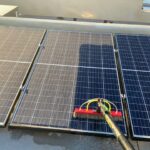When considering solar battery storage in Darwin, there are a lot of factors that you need to take into consideration. You should keep in mind two things: the type of battery you're looking for and how the battery will be used.
When planning for backup power solutions - choosing the right solar battery is extremely important, as its performance and reliability can significantly impact your solar energy experience. In this write-up, we are going to delve into the different types of solar batteries and explore the key metrics that define their effectiveness under varying conditions.
Types of Solar Batteries
There are four types of solar batteries to pair with your residential solar panels Darwin NT:
- Lead acid batteries
- Lithium-ion batteries
- Flow batteries
- Nickel based batteries
Each of these battery backup power solutions has its unique technologies and characteristics and is suitable for different types of solar systems. We will delve into each of them individually
-
Lead Acid Batteries
Invented in 1859, these batteries are the tried and true technologies when it comes to solar batteries. This kind of solar battery storage in Darwin makes use of lead plates and sulphuric acid electrolytes. Electricity is generated by the reaction between lead and lead dioxide during discharge. Recharging reverses the reaction.
| Aspect | Acid Led Batteries |
| Reliability Metrics | |
| Life Cycle | Typically less than 350 cycles. Frequent deep discharges further reduce lifespan |
| Depth of Discharge (DoD) Tolerance | Batteries can be damaged by deep discharges (below 50%). |
| Performance Metrics | |
| Efficiency | 50-95%, depending on discharge rate and depth. |
| Charge/Discharge Rates | Good for starting cars with high current. Charging is slower compared to Li-ion batteries. |
| Applicability in Varying Conditions | |
| Temperature Sensitivity | Responsive to extreme temperatures. Cold weather can significantly reduce performance; overheating can damage batteries. |
| Required Maintenance | Regular topping-up of distilled water (for flooded type) is required to avoid damage. |
Best for:Lead acid batteries are best for off-grid solar energy systems Darwin NT and for emergency power outages
-
Lithium-ion Battery
Among portable electronics, these are the new kids in solar battery storage in Darwin. Lithium-ion batteries use lithium ions moving between electrodes to store energy. They boast higher energy density, longer cycle life, and lighter weight compared to lead-acid. With the rise of electric vehicles, manufacturers use lithium-ion batteries as an energy storage solution.
| Aspect | Lithium - ion Battery |
| Reliability Metrics | |
| Life Cycle | Significantly longer, with a range of 400-1200 cycles based on the type and use. |
| Calendar Life | Loses capacity over time, even when unused. But degradation is slower than that of lead-acid. |
| Performance Metrics | |
| Energy Density | Higher than Lead-Acid. This allows for batteries to be smaller with the same power. |
| Charge Retention | Monthly self-discharge rate less than 5%. |
| Applicability in Varying Conditions | |
| Temperature Range | performs better in temperatures that are a bit wider than those of lead-acid batteries, although extreme temperature can affect the lifespan. |
| Safety Consideration | If damaged or incorrectly charged, Li-ion Batteries can overheat. Specific charging protocols are required. |
Best For: Lithium-ion batteries are best for residential solar installation Darwin NT, becuase of their ability to hold power in limited space. This allows you to use more of the energy stored in the battery - ideal for residential us
-
Flow Battery
This liquid-based battery is an emerging technology in the solar battery storage sector in Darwin. In flow battery electrolytes flow through a stack, chambers or tank, enabling easy capacity scaling. When charged, chemical reactions take place - which allow energy to be stored and then discharged. Over time, the popularity of these batteries has increased.
| Aspect | Flow Battery |
| Reliability Metrics | |
| Capacity Degradation Rates | Low degradation rate compared to all other types of batteries, when properly maintained. |
| Performance Metrics | |
| Scalability | Easy to increase the capacity of tanks by adding more. They are therefore ideal for large-scale storage. |
| Response Time | Slower response time than Li-ion batteries, making them less suitable for applications that require rapid power surges. |
| Applicability in Varying Conditions | |
| Efficiency at Different Scales | Efficiency is relatively consistent at different scales. |
| Required Maintenance | Periodic maintenance is required to ensure electrolyte balance and maintain the flow of fluids. |
Best For: Due to its high current output, they are best for large-scale installation.
-
Nickel Based Batteries
These batteries are the middle ground between lead-acid and lithium-ion. Nickel-based batteries utilize nickel compounds in the positive electrode. They are of two types:
- Nickel-Cadmium (NiCd) - contains cadmium and is used in power tools and professional cameras.
- Nickel Metal Hydride (NiMH) - a better alternative to NiCd because of its higher capacity.
| Aspect | Nickel Based Batteries |
| Reliability Metrics | |
| Life Cycle | Moderate. Depending on the type of discharge and its depth, it can range from 300-500 cycles. |
| Depth of Discharge (DoD) Tolerance | Can tolerate deeper discharges than lead-acid but will still reduce lifespan. |
| Performance Metrics | |
| Efficiency | 66-92% similar to lead acid |
| Charge/Discharge Rates | Slower charging and discharge rates compared with Li-ion. |
| Applicability in Varying Conditions | |
| Temperature Sensitivity | In moderate temperatures, it performs best. It is not as sensitive to extreme temperatures. |
| Required Maintenance | Requires little maintenance. However, manufacturers may recommend periodic refreshing discharges. |
Factors Affecting Reliability and Performance of Solar Batteries
Battery storage for homes plays an important role in saving the sun’s energy, but their effectiveness hinges on two factors: reliability and performance. These can be affected by various conditions, and we are going learn about them:
1. Environmental Conditions
- Temperature: the biggest enemy of batteries is heat. Extreme temperatures accelerate chemical reactions within the battery, which leads to faster degradation and reduced capacity.
- Humidity: High humidity can cause corrosion in battery terminals and promote self-discharge, especially in lead-acid batteries.
- Weather Extremes: Rain, snow, and dust can damage battery casings and disrupt charging/discharging cycles.
2. Usage Patterns
- Charge/Discharge Cycles: The battery lifespan is significantly affected by the number of times the battery is charged and discharged.
- Depth of Discharge(DoD): DoD describes how much capacity is used per discharge cycle. Frequent deep discharges (below 50% for lead-acid, below 20% for Li-ion) can significantly shorten a battery's lifespan.
3. Maintenance
- Lead-Acid Batteries: To prevent damage from electrolyte evaporation, this battery requires periodic topping up of distilled water.
- Lithium-Ion Batteries: Requires minimal maintenance.
- Flow Batteries: Require periodic maintenance to ensure the proper flow of the electrolyte, monitor pressure levels, and address any potential imbalances within the system.
- Nickel-Metal Hydride (NiMH): Requires occasional discharging.
OneRoof Solar Gives You Professional Solar Power Installation Darwin NT
In summary, the reliability and performance of solar battery storage systems can vary significantly under different conditions, making it essential to choose the right type for your specific needs. When considering solar battery storage in Darwin, it's crucial to factor in the region's unique climate and energy demands to ensure optimal performance and longevity.
At OneRoof Solar, we are committed to providing top-tier solar solutions tailored to meet the needs of our customers. We offer zero deposit on solar panels, coupled with premium solar panels starting at only $28 per week, making transitioning to solar energy more accessible than ever. We also offer a range of flexible payment plans and rebates, including a special senior rebate, to further ease the financial burden.
Moreover, our 24-year performance warranty ensures that your investment is protected, guaranteeing long-term benefits and peace of mind. By choosing OneRoof Solar, you not only invest in high-quality solar battery storage but also in a reliable and customer-focused company dedicated to sustainable energy solutions. Let us help you harness the power of the sun efficiently and cost-effectively, ensuring your energy needs are met with the highest standards of performance and reliability.







